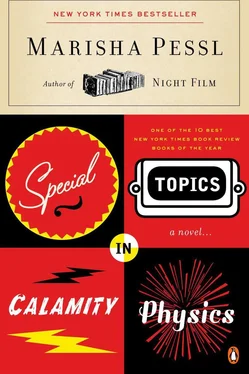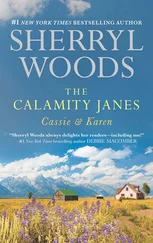She turned off the flashlight. She pressed it into my hand.
“Don’t turn it on unless you have to.”
I could barely hear her, she spoke so quietly.
“Take this, too.” She handed me a thick piece of paper, the map. “A precaution. Don’t lose it. I have the other one, but I’ll need this when I come back. Stay here. Don’t say a word.”
It happened so quickly. She squeezed my arm, let it go, began to move away in the direction of that thing, which I wanted to believe was a bear or wild boar — the most widely distributed land animal, known for running over 40 mph and ripping meat off a man’s bones faster than a truck driver could eat a buffalo wing — but I knew in my heart, it wasn’t. No reference book could second-guess the truth: it had been a human being close to us, what zoologist Bart Stuart calls in Beasts (1998), “the most vicious animal of all.”
“Wait.” My heart felt as if it was being toothpaste-squeezed into my neck. I started to follow her. “Where are you going?”
“I said stay here.”
It was a harsh voice and it stopped me cold.
“I bet that was Charles,” she added gently. “You know him — so jealous. Don’t be afraid.” Her face was large, serious, and even though she smiled, that small smile floating there like a Fall Webworm Moth in the dark, I knew she didn’t actually believe what she said.
She leaned forward, kissed me on the cheek. “Give me five minutes.”
Words tangled in my mouth, in my head. But in the end, I just stood there. I let her go.
“Hannah?”
I began to snivel her name after a minute or two, when I could still hear her footsteps and the realization I was standing alone in this wild jungle hit me, when the woods’ indifference seemed to imply I’d probably die here, shivering, alone, lost, a statistic to be tacked to a police station’s bulletin board, my stiff-smiling class picture (I hoped they didn’t use the one from Lamego High) stuck to the front of a local newspaper, some article about me hashed, rehashed, then recycled into toilet paper or used for house training a pet.
I called her name at least three or four times, but she didn’t answer and soon, soon I couldn’t hear her anymore.
I don’t know how long I waited.
It felt like hours, but the night whirred on, without interruption, so maybe it was fifteen minutes. It was the one thing, oddly enough, I found utterly unbearable: not knowing the time. I understood in full why convicted murderer Sharp Zulett had written in his surprisingly glib autobiography Living in the Pit (1980) (a book I wrongly once thought exceedingly hyper and melodramatic), that “in the fleapit”—the “fleapit” was the pitch-black four-by-nine-foot cell at Lumgate, the maximum-security federal prison outside of Hartford—“you have to make yourself let go of the rope of Time, let yourself float there in the dark, live in it. Otherwise you’ll go mad. You’ll start to see devils. One guy came out of the fleapit after only two days, and he’d pulled out his own eye” (p. 131).
I did my best to live in it. Aloneness settled over me, heavy, like that thing they put over you during X-rays. I sat down on the prickly pine-needled ground, and soon found myself unable to move. Sometimes I thought I heard her coming back, that sweet munch of footsteps, but it was nothing but the trees crashing their arms together as if pretending, in the escalating wind, to play the cymbals.
Whenever I heard an awful noise, one I couldn’t identify, I told myself it was nothing but Chaos Theory, the Doppler Effect or the Heisenberg Uncertainty Principle applied to lost people in the dark. I think I repeated the Heisenberg Uncertainty Principle in my head at least one thousand times: the mathematical product of the combined uncertainties of concurrent measurements of position and momentum in a specified direction could never be less than Planck’s constant, h, divided by 4?. This meant, rather encouragingly, that my uncertain position and zero momentum and the Beast Responsible for the Sound’s uncertain position and uncertain momentum had to sort of null each other out, leaving me with what is commonly known in the scientific world as “wide-ranging perplexity.”
When a person is unaided and terrified for over an hour (again, an approximation), the fear becomes part of the person, another arm. You stop noticing it. You wonder what other people — people who never let others “see them sweat,” to use a familiar phrase — would do in your shoes. You try to let that guide you.
Dad said at the end of his Musical Chair Survival: The Quintessence of Predicaments seminar at the University of Oklahoma at Flitch that one or two individuals in times of crisis turn into Heroes, a handful into Villains, the rest into Fools. “Try not to be a simpering idiot, the Fool category, where one descends into simian simpering, paralyzed by the desire to just die, quickly, painlessly. They want to roll over like possums. Well, decide. Are you a man or are you a nocturnal animal? Do you have courage? Can you comprehend the meaning of ‘do not go gentle into that good night’? If you’re a worthwhile human being, if you’re not just filler, Styrofoam, stuffing for a Thanksgiving turkey, garden mulch — you must fight. Fight. Fight for what you believe in.” (When Dad said the second-to-last “fight,” he slammed his fist onto the podium.)
I stood up, my knees stiff. I turned on the flashlight. I hated the seedy light the flashlight made. I felt as if I were shining it into an orgy of trees, gaunt, naked bodies crowding together to hide themselves. Little by little, I began to proceed in what I guessed was the direction Hannah had gone. I followed the flashlight, playing a little game with myself by pretending I wasn’t directing it, but God was (with the help of a few bored angels), not because He favored me over everyone else on earth in a quandary, but because it was a slow night, and He had very little on his radar in terms of Widespread Panic or Genocide.
At certain times, I stopped, listened, tiptoed around grimy thoughts of being followed, raped and killed by an enraged parkie with pointy teeth and a chest like a sandbag, my life ending up nothing more than an agonizing? in the vein of Violet Martinez. I concentrated instead on the laminated map Hannah had given me, labeled at the top “The Great Smoky Mountain National Park” (underneath this headline, rather meekly: “Courtesy of Friends of the Smokies”), with its helpful labels and blobs of mountains, color corresponding to elevation—“Cedar Gorge,” I read, “Gatlinburg Welcome Center,” “Hatcher Mountain,” “Pretty Hollow Gap,” “6,592 ft. above sea level.” Having no inkling where I was, I’d have been just as well off with a page from Where’s Waldo? (Handford, 1987). Still, I took great care to shine the flashlight onto it, study all those squiggly lines and the pleasant Times New Roman font, that prim Key, little pledges, little pats on the back, assuring me that in this dark there was an Order, a Grand Scheme of Things, that the armless, headless tree standing in front of me, was somewhere, a speck, on the map here, and all I needed to do was find the thing that would link the two elements and suddenly (with a little poof of light) the night would flatten and divide into asparagus green squares I could follow home, A3ing, B12ing, D2ing back to Dad.
I also couldn’t stop thinking about the blueprint of a story Hannah had mentioned back in the fall (no details, only bare bones dimensions of what had happened) — the occasion in the Adirondacks when she’d saved the life of a man who injured his hip. She’d said she “ran and ran,” eventually finding campers with radios, and I thus started mentally cheerleading: perhaps I, too, would come across Campers with Radios, perhaps Campers with Radios were simply around the bend. But the longer I walked and the trees swarmed like prisoners wanting to be fed, the more it occurred to me I was as likely to find Campers with Radios as I was to find a brand-new Jeep Wrangler parked in a clearing with keys in the ignition and a full tank of gas. There was nothing here, nothing but me, the branches, the quicksand darkness. I couldn’t help but wonder what screwy environmentalists were always complaining about, the “diminishing environment” and such, because there was a surplus, an overkill of Environment; it was time to come in here and start clear-cutting, put up Dunkin’ Donuts and a parking lot as far as the eye could see, big, square and exposed, lit up at midnight like an August afternoon. In such a wonderful place, one’s shadows were not mangled but drifting behind you in long neat lines. You could take a protractor to them and effortlessly determine the exact angle to your feet: thirty degrees.
Читать дальше












